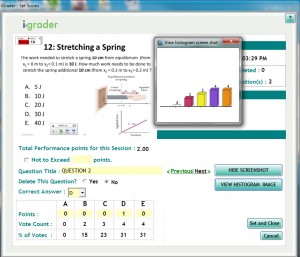 If you still have doubts about the effectiveness of conceptual questions in teacher education, take a look at what our students (future mathematics and science teachers) have to say about them. In our physics methods course for future physics teachers we used these questions extensively. In the figure, you can see one example of a question used with future physics teachers. While initially, students’ responses differed widely, this question promoted a very interesting discussion, as well as presentations of multiple ways of solving the problem:
If you still have doubts about the effectiveness of conceptual questions in teacher education, take a look at what our students (future mathematics and science teachers) have to say about them. In our physics methods course for future physics teachers we used these questions extensively. In the figure, you can see one example of a question used with future physics teachers. While initially, students’ responses differed widely, this question promoted a very interesting discussion, as well as presentations of multiple ways of solving the problem:
“I have found the conceptual clicker questions from your classroom to be probably the most useful and illuminating part of my classes. This format provides an environment in which the class feels comfortable investigating and exposing their misconceptions and beliefs about physics”. “The use of conceptual questions and clickers is very engaging and intellectually stimulating. The clickers create a safe learning environment where students do not have to fear giving an incorrect response to the teacher. I look forward to using this in my future classroom”. “I feel that the use of clickers in classroom can keep a student anonymous. It reduces stress among students due to embarrassment of failure, and at the same time it helps instructor assess the success of the teaching strategies. Whereas, if they are simply asked if they have any questions or understood the concept, they might just nod without any understanding. It can give false expression of their understanding, mitigating their learning potential”. And here is the feedback from high school students and teachers: “I liked these questions and would like to see more of these in class. Questions like these make you think and personally I can’t understand physics without thinking about the principles I learn in class” (Student 1). “The questions challenged me and really made me think, it was more than just plugging in numbers” (Student 2). “The question with the free falling target was a very good question. It really got me thinking about it. It was confusing to begin with, but then when it was explained, it made more sense” (Student 3). “As a teacher, I think they are very valuable resources because they are engaging, they address common misconceptions, they can generate great class discussions promoting critical thinking and they motivate students to carry out further practical work to confirm predictions.” (A physics teacher).
